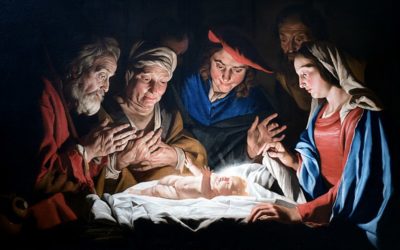After his trip to Missouri, the Prophet Joseph Smith, along with Sidney Rigdon and Oliver Cowdery, arrived home in Kirtland on August 27, 1831. During their absence, apostasy had begun to take hold in the Church, and among the faithful, there were many questions about the upbuilding of Zion. On August 30, the Lord gave a revelation to further guide the Church in these challenging times.
Willing to Take Upon Us the Lord’s Name
It began, “Hearken, O ye people, and open your hearts and give ear from afar; and listen, you that call yourselves the people of the Lord, and hear the word of the Lord and his will concerning you” (verse 1). The words “you that call yourselves the people of the Lord” are interesting to contemplate. As Church members, we bear the name of Jesus Christ and covenant each week in sacrament meeting that we are willing to do so. But do our actions show we are really His people? This verse seems to be asking Church members to show their commitment by their actions, not just by their words. This is a command to exercise faith, which is not just belief but belief and action combined.
Faith and Signs
The second verse of the revelation expressed the Lord’s wrath toward “the wicked and rebellious.” The Lord let them know that He could “take even them whom he will take,” “preserveth in life them whom he will preserve,” “buildeth up at his own will and pleasure,” “destroyeth when he pleases,” and can “cast the soul down to hell” (verses 3‒4).
The Lord warned the rebellious unbelievers that the day would come when “all flesh shall know that I am God” (verse 6). His warnings pointed specifically at sign-seekers. “He that seeketh signs shall see signs,” he warned, “but not unto salvation” (verse 7). Earlier that month, the Lord had confirmed that signs would follow belief (Doctrine and Covenants 58:64), not the other way around. As President Spencer W. Kimball later made famous in the title of one of his books, Faith Precedes the Miracle, not the other way around.
“Verily, I say unto you,” the Lord now warned in section 63, “there are those among you who seek signs, and there have been such even from the beginning; but, behold, faith cometh not by signs, but signs follow those that believe. Yea, signs come by faith, not by the will of men, nor as they please, but by the will of God. Yea, signs come by faith, unto mighty works, for without faith no man pleaseth God; and with whom God is angry he is not well pleased; wherefore, unto such he showeth no signs, only in wrath unto their condemnation. Wherefore, I, the Lord, am not pleased with those among you who have sought after signs and wonders for faith, and not for the good of men unto my glory.” (Verses 8‒12.)
Chaste Thoughts and Actions
The Lord also had strong words for those who had violated His commandments, particularly the law of chastity. “I give commandments,” the Lord told the rebellious in the Church, “and many have turned away from my commandments and have not kept them. There were among you adulterers and adulteresses; some of whom have turned away from you, and others remain with you that hereafter shall be revealed. Let such beware and repent speedily, lest judgment shall come upon them as a snare, and their folly shall be made manifest, and their works shall follow them in the eyes of the people.” (Verses 13‒15.)
The Lord then repeated His New Testament standard of chastity. “And verily I say unto you, as I have said before, he that looketh on a woman to lust after her, or if any shall commit adultery in their hearts, they shall not have the Spirit, but shall deny the faith and shall fear. Wherefore, I, the Lord, have said that the fearful, and the unbelieving, and all liars, and whosoever loveth and maketh a lie, and the whoremonger, . . . shall have their part in that lake which burneth with fire and brimstone, which is the second death. Verily I say, that they shall not have part in the first resurrection. And now behold, I, the Lord, say unto you that ye are not justified, because these things are among you.” (Verses 16‒19.)
In other words, the unrepentant rebels had a dismal future spiritually. “Nevertheless,” the Lord added, encouraging the faithful and repentant, “he that endureth in faith and doeth my will, the same shall overcome, and shall receive an inheritance upon the earth when the day of transfiguration shall come; when the earth shall be transfigured, even according to the pattern which was shown unto mine apostles upon the mount; of which account the fulness ye have not yet received.” (Verses 20‒21.)
How to Build Zion
These words surely engaged the faithful, who were eager to prepare the way for the Lord’s coming and to know more about it. The Lord had told the Saints in the Book of Mormon that if they wanted “to know the mysteries of God,” they needed to give “heed and diligence” to His commandments (Alma 12:9). Now in section 63, the Lord chided, “I will make it known unto you, not by the way of commandment, for there are many who observe not to keep my commandments” (verse 22). “But unto him that keepeth my commandments I will give the mysteries of my kingdom, and the same shall be in him a well of living water, springing up unto everlasting life” (verse 23).
The particular mystery that many Saints wanted unfolded to them was when they could go to Zion in Missouri and help build it up. The Lord answered “concerning his saints, that they should assemble themselves together unto the land of Zion, not in haste, lest there should be confusion, which bringeth pestilence” (verse 24). In other words, the Lord wanted to check the excessive zeal of Saints who would go rushing to Zion and become dependent on others to provide for them, rather than contributing through their own efforts.
“Behold, the land of Zion,” the Lord explained. “I, the Lord, hold it in mine own hands; nevertheless, I, the Lord, render unto Cæsar the things which are Cæsar’s. Wherefore, I the Lord will that you should purchase the lands, that you may have advantage of the world, that you may have claim on the world, that they may not be stirred up unto anger. For Satan putteth it into their hearts to anger against you, and to the shedding of blood.” (Verses 25‒28.)
In other words, the Lord was saying, if you want Zion to succeed, you have to go in an orderly way and purchase lands piece by piece so that you have the right to settle there. If the overzealous go rushing in, telling their new neighbors that the Lord has given them the land, the neighbors will become alarmed at the influx of newcomers and rise up against them, shedding their blood. Then the only way to get the land would be to conquer those who rose up against them—not a happy prospect.
“Wherefore,” the Lord told the Saints, “the land of Zion shall not be obtained but by purchase or by blood, otherwise there is none inheritance for you. And if by purchase,” which is what the Lord wanted them to do, “behold you are blessed; and if by blood, as you are forbidden to shed blood, lo, your enemies are upon you, and ye shall be scourged from city to city, and from synagogue to synagogue, and but few shall stand to receive an inheritance.” (Verses 29‒31.)
To put it another way, there were the hardworking Saints who were prepared to do things the way the Lord wanted, and then there were the freeloaders who looked at the concept of Zion as a way for them to get free land without working. Although they claimed to be good members, they wanted blessings without obedience and hard work. In the long run, these zealots would undermine the cause of Zion.
Preparing Ourselves for the Lord’s Coming
The Lord will be merciful to the repentant, but he has punishments in store for those who do not repent, and is “angry with the wicked” and because of these is “holding my Spirit from the inhabitants of the earth” (verse 32). Wickedness, the Lord decreed, would result in “wars upon the face of the earth,” as a result of which “the wicked shall slay the wicked, and fear shall come upon every man” (verse 33).
“And,” He added, “the saints also shall hardly escape; nevertheless, I, the Lord, am with them, and will come down in heaven from the presence of my Father and consume the wicked with unquenchable fire” (verse 34). Many of those in Joseph Smith’s day felt the coming was imminent; yet the Lord cautioned, “this is not yet, but by and by” (verse 35).
In preparation for that day, the Lord asked that His Saints be “assembled upon the land of Zion” (verse 36). He also asked “that every man should take righteousness in his hands and faithfulness upon his loins, and lift a warning voice unto the inhabitants of the earth; and declare both by word and by flight that desolation shall come upon the wicked” (verse 37).
In other words, all members were to be missionaries, wherever they happened to be. Specific groups, in an orderly way, were to proceed to Missouri to settle in Zion as land became available (verses 38‒40).The Lord would appoint those groups through His prophet: “Behold, I, the Lord, will give unto my servant Joseph Smith, Jun., power that he shall be enabled to discern by the Spirit those who shall go up unto the land of Zion, and those of my disciples who shall tarry” (verse 41).
For a Season
Bishop Newel K. Whitney, who ran a store in Kirtland, was to “retain his store . . . yet for a little season” (verse 42). But Newel was to “impart all the money which he can impart, to be sent up unto the land of Zion” (verse 43). Yet there was no coercion in this. “These things are in his own hands,” the Lord said. “Let him do according to wisdom” (verse 44).
(For more on the Newel K. Whitney store, click here.)
Since Newel was to remain in Kirtland for a time, the Lord directed that he be ordained “as an agent unto the disciples that shall tarry” (verse 45), to handle temporal matters, especially for those called to go to Zion.
Meanwhile, the other Church leaders, including Joseph Smith and Oliver Cowdery,” were to visit the Church’s various branches, “expounding these things unto them” and soliciting donations to purchase land in Zion on which members could settle (verse 46). The Lord promised those who were “faithful and endureth” that they “shall overcome the world” (verse 47).
Life, Death, and the Millennium
Those who “sendeth up treasures unto the land of Zion shall receive an inheritance in this world, and his works shall follow him, and also a reward in the world to come.” Those who died “in the Lord” before reaching Zion would also be blessed. When the Lord came again and the earth was renewed, “they shall rise from the dead and shall not die after, and shall receive an inheritance before the Lord, in the holy city.” (Verse 48.)
The righteous who were living at the Second Coming would still be “appointed . . . to die at the age of man” (verse 50). “Children shall grow up until they become old; old men shall die; but they shall not sleep in the dust, but they shall be changed in the twinkling of an eye” (verse 51).
The Saints were understandably eager to go to Zion and somewhat impatient when all were not allowed to rush there at once. “These things are the things that ye must look for,” the Lord said—meaning living righteously with the realization that the worthy would all someday live in the city of God. Many of the Saints were overeager because of the prophecies about how soon the Lord would be coming.
Again the Lord cautioned, “speaking after the manner of the Lord, they are now nigh at hand,” but that will not be until “a time to come, even in the day of the coming of the Son of Man” (verse 53). What mattered most was whether the Saints were living righteously, not whether they happened to make it physically to Zion before the Lord’s coming. “Until that hour,” the Lord warned, “there will be foolish virgins among the wise.” The foolish virgins could expect that when “that hour cometh” there would be “an entire separation of the righteous and the wicked,” with the foolish virgins being counted among the wicked. “In that day,” the Lord said, “will I send mine angels to pluck out the wicked and cast them into unquenchable fire” (verse 54).
Fulfilling Our Callings
One of those whose performance was lacking at this stage was Sidney Rigdon. The Lord chastised Sidney because “he exalted himself in his heart, and received not counsel, but grieved the Spirit” (verse 55). Sidney was held in high esteem by Church members because of his age and experience as a Protestant minister who led many of those members before they joined the Church. But the Lord had commanded him to write about Zion, and his writing was lackluster. “Wherefore,” the Lord told Joseph, “his writing is not acceptable unto the Lord, and he shall make another; and if the Lord receive it not, behold he standeth no longer in the office to which I have appointed him” (verse 56).
There was a great deal of excitement about gathering to Zion in Missouri, which was not being allowed as quickly as the overzealous wanted. The Lord gave them a more important job for the time being, which was to preach my gospel. “Those who desire in their hearts, in meekness, to warn sinners to repentance, let them be ordained unto this power” (verse 57), the Lord commanded. “For this is a day of warning, and not a day of many words” (verse 58).
Speaking of Sacred Things with Care
The Lord also wanted the Saints to clean up their language. They were all new converts of less than two years, and they had brought the language habits they had before their conversions. “I, the Lord, am not to be mocked in the last days” (verse 58), the Lord declared. “Behold, I am from above, and my power lieth beneath. I am over all, and in all, and through all, and search all things, and the day cometh that all things shall be subject unto me. Behold, I am Alpha and Omega, even Jesus Christ. Wherefore, let all men beware how they take my name in their lips—For behold, verily I say, that many there be who are under this condemnation, who use the name of the Lord, and use it in vain, having not authority.” (Verses 59‒62).
“Wherefore,” the Lord commanded “let the church repent of their sins, and I, the Lord, will own them; otherwise they shall be cut off. Remember that that which cometh from above is sacred, and must be spoken with care, and by constraint of the Spirit; and in this there is no condemnation, and ye receive the Spirit through prayer; wherefore, without this there remaineth condemnation.” (Verses 63‒64).
Overcome Through Patience
The Church’s most senior leaders were to remain in Kirtland, where they had been living temporarily with others. Now the Lord commanded Joseph and Sidney to “seek them a home, as they are taught through prayer by the Spirit” (verse 65), something that must surely have comforted their wives and children. It was tough to live with others and not have their own home. But serving the Lord sometimes required such sacrifices. “These things remain to overcome through patience,” the Lord said, “that such may receive a more exceeding and eternal weight of glory, otherwise, a greater condemnation” (verse 66).
During the time Joseph and Emma lived in Ohio, they lived in five different homes. For more about this, click here.
For more on the history of this revelation, click here.
Credit for image at top of post: Stock image from depositphotos.com.



